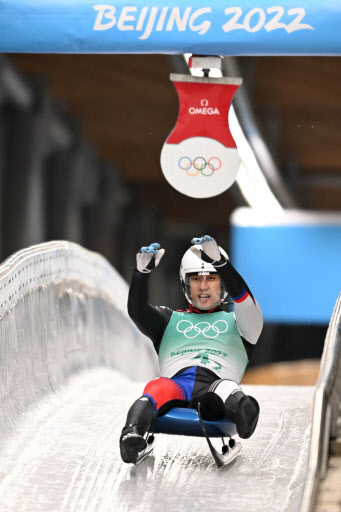S. Korea pondering future in luge after 2 veterans retire
By YonhapPublished : Feb. 11, 2022 - 13:57

BEIJING -- The end of the luge competition at Beijing 2022 meant the conclusion of careers for two leading South Korean lugers, leaving the country to ponder its next steps toward international relevance in the sliding event.
The team relay event at Yanqing National Sliding Centre in Yanqing, northwestern Beijing, on Thursday wrapped up the luge portion of the Olympics, with South Korea finishing in 13th place.
Aileen Frisch, the German native who became naturalized as a South Korean in 2016, and Lim Nam-kyu, a veteran of two Olympics, had both said Beijing would be their final Olympics. Their departure will be an end of an era in the still nascent history of luge in South Korea.
They both bounced back from serious injuries to race here. In Lim's case, he was coaxed out of retirement after the 2018 PyeongChang Winter Olympics because the Korea Luge Federation didn't think it could find another luger to compete in Beijing.
Frisch, 29, broke both of her hands and her tailbone in a hard crash during an International Luge Federation (FIL) World Cup race three years ago. She has talked about the lingering effects of those injuries and how she feared they would affect her day-to-day life away from the track after the end of her career.
Lim, 32, battled through a serious calf injury late last year to secure an Olympic quota spot for South Korea.
Frisch was one of several foreign-born athletes fast-tracked to South Korean passports before PyeongChang 2018, with the host country hoping to generate more interest in sports largely unfamiliar to the general public.
Other South Korean-born lugers at Beijing had their introduction to luge late. Lim only picked up the sport at age 24. The doubles duo of Park Jin-yong and Cho Jung-myung, both 28, also came to luge late after playing other sports as teenagers. In the years leading up to PyeongChang, South Korea scrambled to find and develop athletes in niche sports like luge but didn't necessary have a long-term vision that extended beyond 2018.
Park and Cho, both 28, have competed in three Olympics together, and a fourth seems unlikely. And the Korean luge pipeline is fairly dry at this point.
Luge powerhouses like Germany, which swept up all four gold medals here, have a far richer history and tradition in the sport, and their athletes all start early.
Experts say luge, compared to skeleton and bobsleigh, requires more delicate touch and control of the sled, and that can only come from extensive experience, starting in the junior ranks.
The Korean federation is hopeful that a pair of high school lugers, Kim Kyung-rok and Kwon Oh-min, will take the torch and carry it to a higher place at future Olympics. Now in high school, Kim and Kwon both started luge in their second year in middle school.
Park and Cho finished ninth in the doubles event in 2018, while Frisch finished the women's event in eighth at the same competition. But that's as close as South Korea has come to a medal at the Olympic Games. (Yonhap)



![[Exclusive] Korean military set to ban iPhones over 'security' concerns](http://res.heraldm.com/phpwas/restmb_idxmake.php?idx=644&simg=/content/image/2024/04/23/20240423050599_0.jpg&u=20240423183955)




![[Herald Interview] 'Amid aging population, Korea to invite more young professionals from overseas'](http://res.heraldm.com/phpwas/restmb_idxmake.php?idx=644&simg=/content/image/2024/04/24/20240424050844_0.jpg&u=20240424200058)

![[Pressure points] Leggings in public: Fashion statement or social faux pas?](http://res.heraldm.com/phpwas/restmb_idxmake.php?idx=644&simg=/content/image/2024/04/23/20240423050669_0.jpg&u=)









